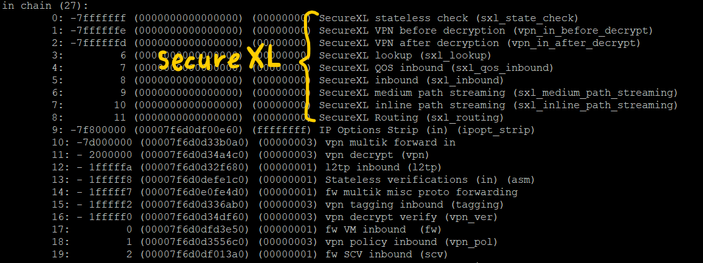Dear all,
In order to troubleshoot an issue I need to capture traffic in the following way:
- Traffic between hosts A and B & A and C for ICMP only
- Traffic between hosts A and B & A and C for all protocols
The reason I want to capture this traffic is because I am troubleshooting a strange issue related to ICMP, but I would like to have a capture of all the protocols as well in case nothing interesting shows up in the ICMP capture and it might be related to something else.
So far I was planning to use -F to achieve this with two captures as follows:
- One ICMP capture for both couple of hosts using 4 instances of -F parameter: fw monitor -F "a.a.a.a,0,b.b.b.b,0,1" -F "b.b.b.b,0,a.a.a.a,0,1" -F "a.a.a.a,0,c.c.c.c,0,1" -F "c.c.c.c,0,a.a.a.a,0,1" -o /<file to .cap>
- One All protocols capture for both couple of hosts using another 4 instances of -F: fw monitor -F "a.a.a.a,0,b.b.b.b,0,0" -F "b.b.b.b,0,a.a.a.a,0,0" -F "a.a.a.a,0,c.c.c.c,0,0" -F "c.c.c.c,0,a.a.a.a,0,0" -o /<file to .cap>
However, I was wondering if I could manage to achieve that within only one capture instead of two, since only one fw monitor can run and I would like to ideally reduce the number of captures needed as much as possible based on my environment constrains. For that, I was looking if I could use -f with an INSPECT file instead.
Is it possible to both capture ICMP only and all protocols traffic using one -f inspect file? I believe not but I if somebody could help validate that. In addition, from what I understand using -e or -f it does not apply to accelerated traffic, in that case would it be more recommended for me to just use -F since I can't disable acceleration in my case for the capture?
I also seem to have another strange problem when testing my filters using -f with a file, when I put my filters in the file and load it with -f it does not seem to work (it captures all traffic), but if I use the same filter in a -e expression, it works as expected.
For exemple, if I put the below in a file and load it via fw monitor -f <path to file>
#include "fwmonitor.def"
ip_p=1, ((src=a.a.a.a , dst=b.b.b.b) or (src=b.b.b.b , dst=a.a.a.a) or (src=a.a.a.a , dst=c.c.c.c) or (src=c.c.c.c , dst=a.a.a.a)), accept;
(I tried with accept at the beginning or end of the line, same results).
It does not seem to work and all captures is shown. But if I do fw monitor -e "accept ip_p=1, ((src=a.a.a.a , dst=b.b.b.b) or (src=b.b.b.b , dst=a.a.a.a) or (src=a.a.a.a , dst=c.c.c.c) or (src=c.c.c.c , dst=a.a.a.a));"
Lastly, when using -F, the last parameter (protocol number) when set to 0, captures all traffic. But when using ip_p=0 it does not seem to do so, I guess to achieve the same and capture all protocols when using -e or -f you just don't specify a protocol.
Apologies if some of the questions seem basic but I have not played with fw monitor a lot so I am trying to get a better understanding of it and apply to my situation to be more efficient.
Thank you for reading me.



